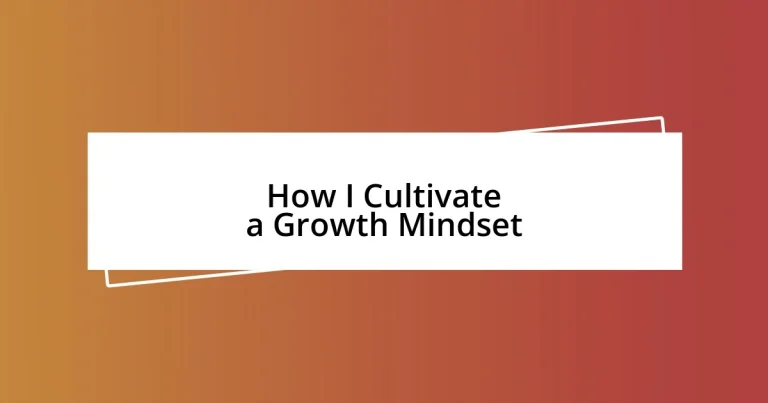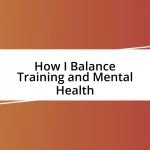Key takeaways:
- A growth mindset centers on the belief that abilities can be developed through perseverance and constructive feedback.
- Recognizing and addressing fixed mindset triggers, such as harsh feedback and fear of failure, empowers individuals to respond positively and embrace challenges.
- Daily practices, such as journaling and celebrating progress, alongside surrounding oneself with growth-oriented people, fosters a culture of continuous learning and resilience.
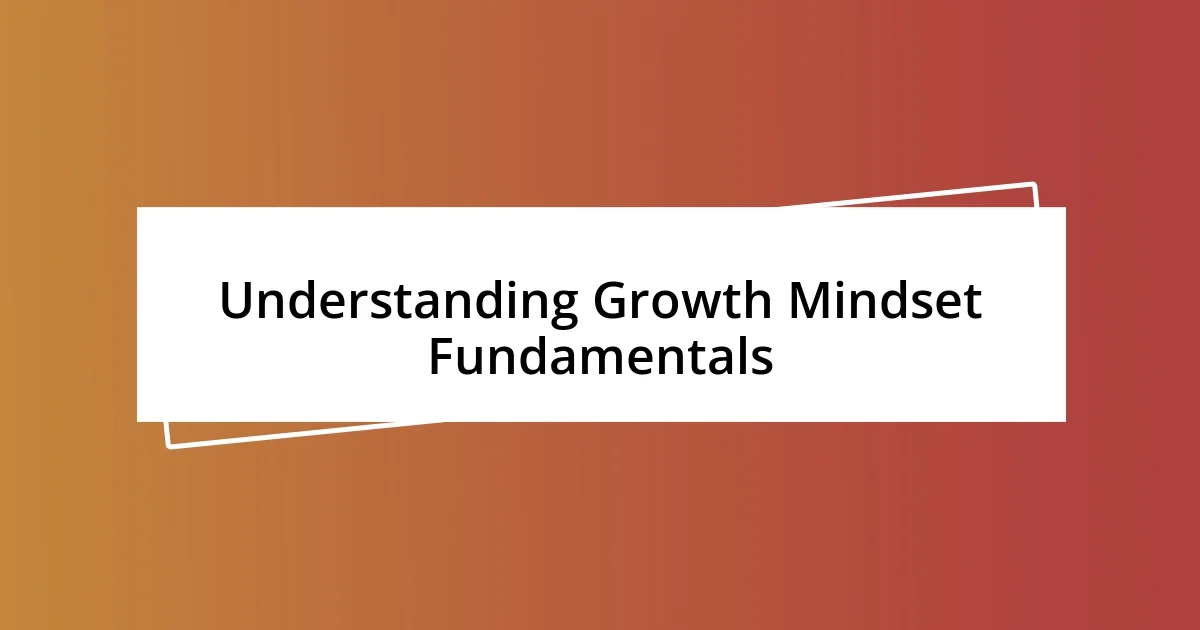
Understanding Growth Mindset Fundamentals
A growth mindset is the belief that abilities and intelligence can be developed through dedication and hard work. I recall when I first faced a challenging project at work; I was daunted by the scope of it. Instead of feeling defeated, I embraced the challenge, convinced that the effort would teach me valuable lessons along the way.
This mindset promotes resilience in the face of setbacks. I’ll never forget the moment I struggled with a tough skill—each mistake felt like a roadblock. But then, I flipped the script in my mind. What if each mistake was a stepping stone rather than a stumbling block? This shift in perspective transformed my approach to learning.
Understanding a growth mindset involves recognizing that feedback is a tool for learning, not a personal critique. I used to dread performance reviews, fearing judgment. Once I shifted my thinking, I realized that constructive feedback was a gift, offering insights I could use to grow. Embracing this mindset can illuminate paths we never thought possible.
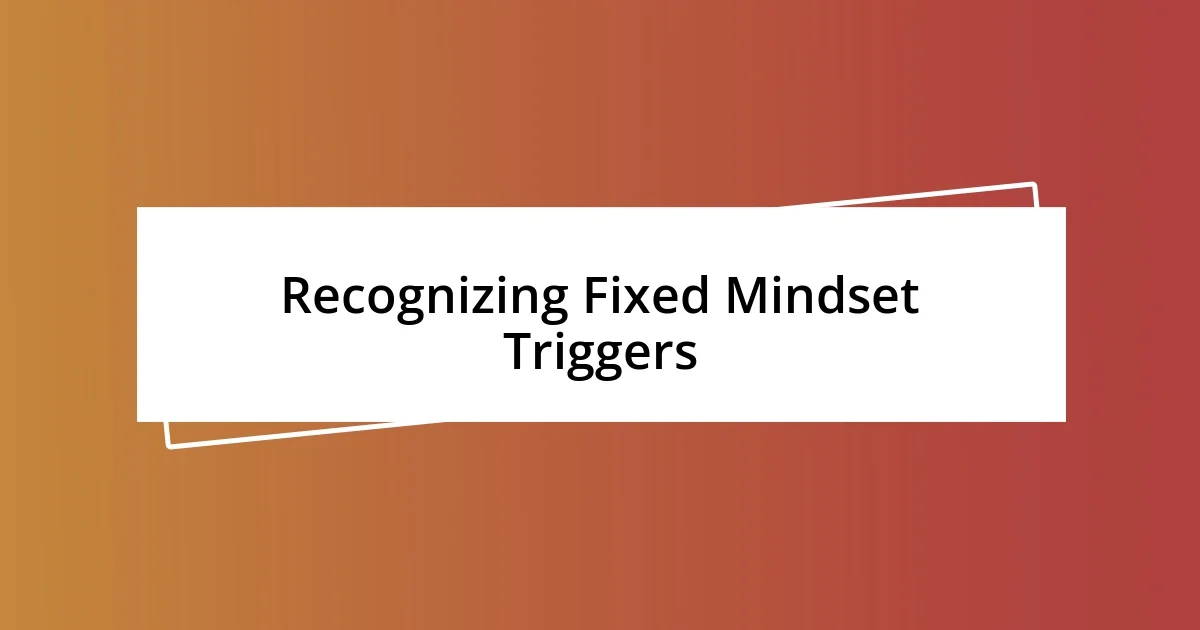
Recognizing Fixed Mindset Triggers
Recognizing fixed mindset triggers is crucial for anyone aiming to shift towards a growth mindset. I remember a specific moment in my career when I received a harsh critique on a project I had poured my heart into. My initial instinct was to feel defensive and discouraged. This reaction was a clear sign of a fixed mindset trigger—seeing feedback as an attack rather than a springboard for improvement. Acknowledging these triggers can empower us to respond differently.
Another common trigger is the fear of failure. I once hesitated to take on a leadership role within my team because I worried I wouldn’t meet expectations. That fear held me back for quite some time. It was only when I started to view challenges as opportunities for growth that I began to dismantle that fixed mindset. By recognizing when fear takes hold, I can consciously choose to lean into the discomfort, thus fostering resilience.
Sometimes, comparing ourselves to others can be an insidious trigger. I’ve regrettably found myself scrolling through social media and feeling inadequate when I saw peers achieving milestones I hadn’t reached. This triggered a fixed mindset response, leaving me feeling stagnant. It wasn’t until I consciously practiced gratitude for my own journey that I could shift my focus and appreciate my progress, paving the way for a more growth-oriented perspective.
| Fixed Mindset Trigger | Potential Response |
|---|---|
| Harsh Feedback | View as a Learning Tool |
| Fear of Failure | Embrace Challenges |
| Comparing to Others | Practice Gratitude |
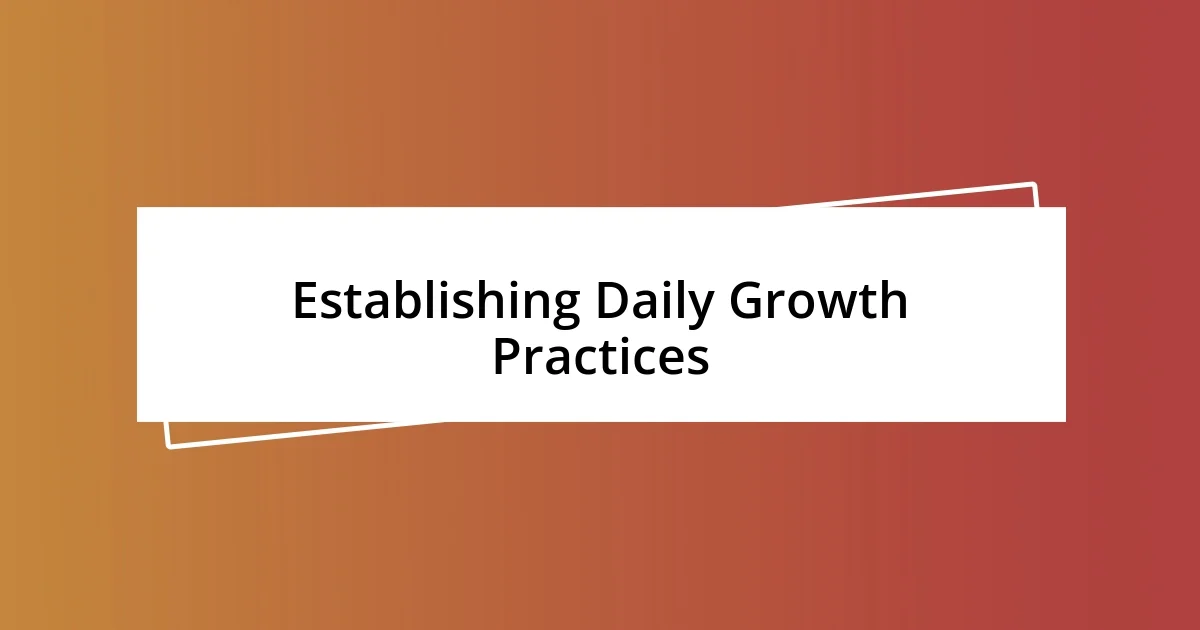
Establishing Daily Growth Practices
Establishing daily growth practices is an impactful way to seamlessly integrate a growth mindset into every aspect of life. For instance, I start each morning with a quick reflection, jotting down what I hope to learn or improve that day. This simple ritual has not only clarified my goals but has also fostered a sense of accountability. It’s amazing how just focusing my thoughts on growth can set a positive tone for the entire day.
Here are some effective daily practices to cultivate that mindset:
- Daily Journaling: Capture thoughts and insights about daily challenges and what you’ve learned from them.
- Set Small Goals: Focus on small, achievable tasks that build toward larger objectives.
- Seek Feedback: Regularly ask for constructive criticism from peers; view it as input for personal growth.
- Read and Reflect: Dedicate time to reading insightful books or articles that push your thinking.
- Celebrate Progress: Acknowledge and celebrate even small accomplishments to reinforce positive change.
I find that incorporating these practices doesn’t just enhance my skills; it also creates a sense of excitement about learning. There’s something invigorating about knowing that each day offers new opportunities for growth and self-discovery.
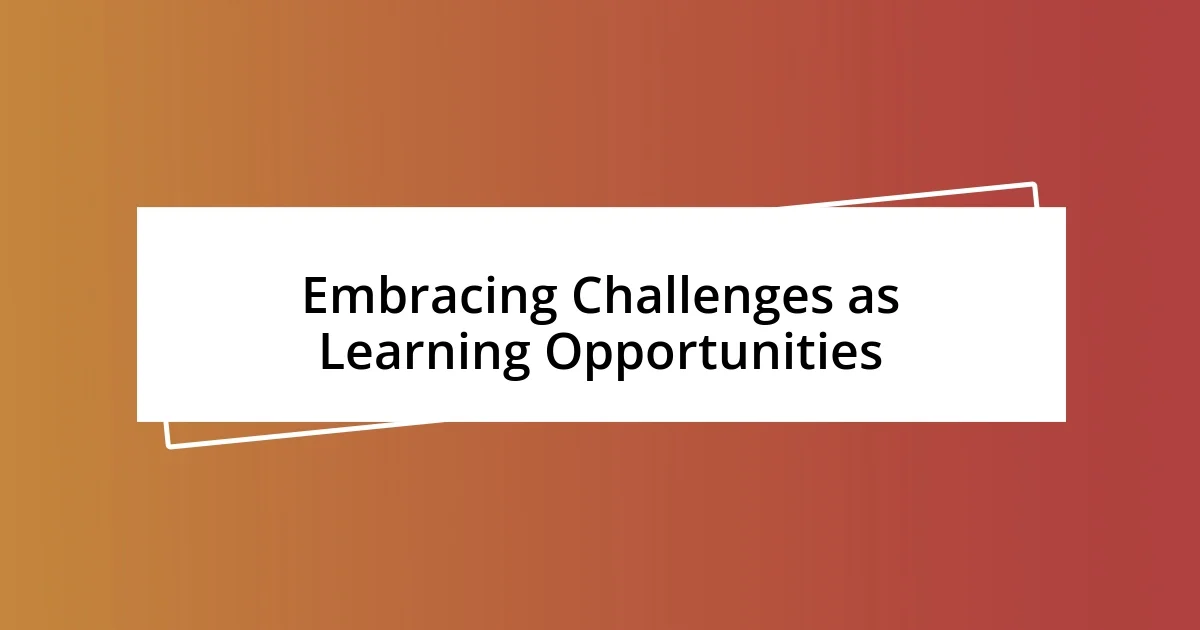
Embracing Challenges as Learning Opportunities
Embracing challenges as learning opportunities has truly transformed my perspective on setbacks. I vividly recall struggling with a complex project that, at first, seemed utterly overwhelming. Instead of giving in to frustration, I decided to dissect my challenges into smaller tasks. This approach not only made the project manageable but sparked a realization: every obstacle holds a lesson, waiting to be uncovered. Have you ever faced a seemingly insurmountable task? I found that breaking it down often reveals paths I hadn’t noticed before.
In another instance, I faced a significant setback when I was working on a presentation. It didn’t resonate with my audience, and I felt the sting of disappointment. In that moment, I had two choices: dwell on the failure or analyze what went wrong. I chose the latter. I sought feedback and studied how my message could have been clearer. This not only improved my future presentations but also reinforced the notion that failure isn’t a dead end; it’s merely a detour towards growth and improvement.
I also reflect on moments when challenges pushed me out of my comfort zone, like taking on tasks that felt beyond my capabilities. One time, volunteering for a committee role initially filled me with anxiety. Yet, as I immersed myself in the work, I discovered new skill sets I never knew I had. When was the last time you stepped outside your comfort zone? Embracing those moments not only builds resilience but also opens up a world of possibilities for personal and professional growth.
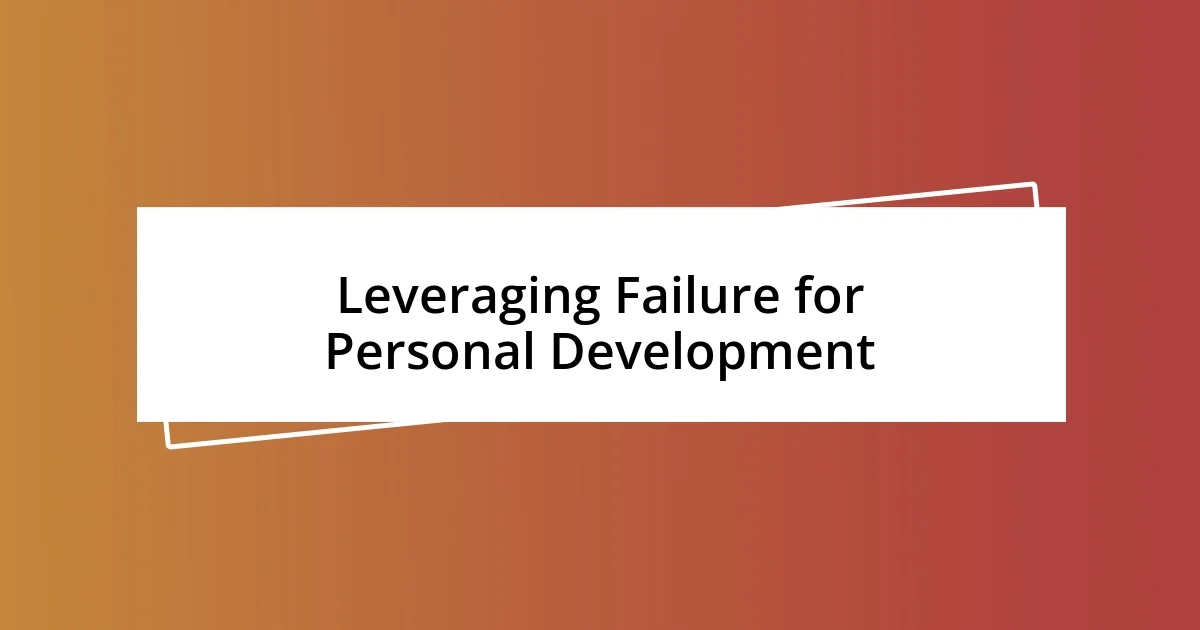
Leveraging Failure for Personal Development
Failure can feel daunting, but I’ve learned to view it as a stepping stone for personal growth. There was a time when I launched a new initiative at work, only for it to miss the mark completely. Instead of hiding from that mistake, I chose to analyze what went wrong and openly share those findings with my team. It was surprising to see how this transparency not only fostered trust but also turned a painful experience into a valuable lesson for all of us. Have you ever turned a blunder into a learning moment?
Reflecting on my journey, I remember a particularly challenging time in my career when I made a critical error on a project deadline. My first instinct was to wallow in self-pity, feeling the weight of disappointment. However, once I’d allowed myself a moment to breathe, I began to dissect the process that led to failure. This experience taught me the importance of time management and prioritizing tasks. What if I had never faced that setback? I might still be making the same mistakes. Ultimately, failure forced me to rethink my approach and refine my skills.
Another example that stands out occurred during my first public speaking engagement. I stumbled over my words and felt the embarrassment wash over me. In that vulnerable moment, however, I realized that the audience did not dwell on my missteps, but rather showed support. This epiphany shifted my perspective on failure; I began to see it as an opportunity to connect more deeply with my audience through authenticity. Have you considered how your failures can foster connection? Each time I embrace vulnerability in the face of failure, I empower myself and those around me to do the same, transforming what could have been a slip into a powerful lesson in resilience.
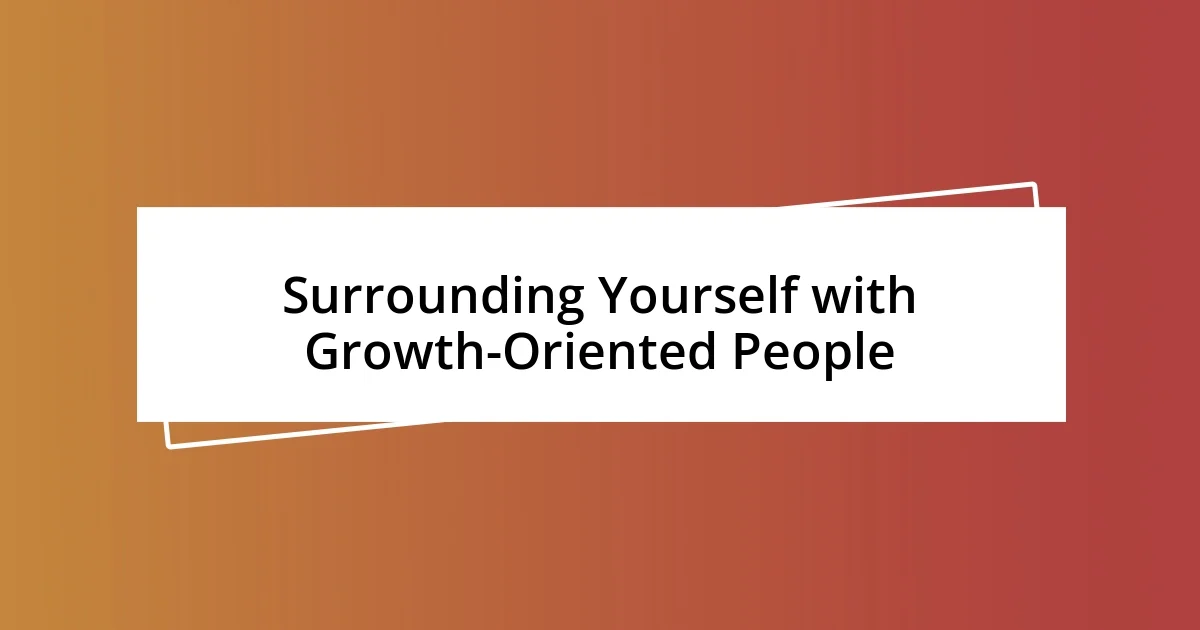
Surrounding Yourself with Growth-Oriented People
Building relationships with growth-oriented people has been a game changer for me. I remember joining a networking group focused on professional development. The energy in the room was contagious—everyone was eager to share their journeys and support each other’s growth. It felt like stepping into a garden where everyone was nurturing their own plants, while helping others cultivate theirs. Have you ever experienced that uplifting atmosphere? Surrounding yourself with people who are committed to self-improvement fosters a mindset that embraces learning and resilience.
On another occasion, I found myself gravitating toward a colleague who always approached challenges with a positive outlook. Her perspective on setbacks—viewing them as opportunities for growth—inspired me to shift my own mindset. I began to regularly seek her advice, and every conversation added a new layer to my understanding of resilience. How often do we overlook the gems of wisdom others can offer? By connecting with those who embrace a growth mindset, I started to see obstacles in a different light, realizing they were not roadblocks but stepping stones.
I also had an eye-opening experience with a mentor who challenged my assumptions. During one of our discussions, we dove deep into my fears surrounding failure. Instead of dismissing my worries, he encouraged me to confront them head-on. This simple act of encouragement sparked significant change in me. Have you ever had someone believe in you before you believed in yourself? I began to surround myself with individuals who not only uplifted me but also held me accountable to my growth. This supportive network became my inspiration—reminding me that I’m not alone in this journey toward cultivating a growth mindset.
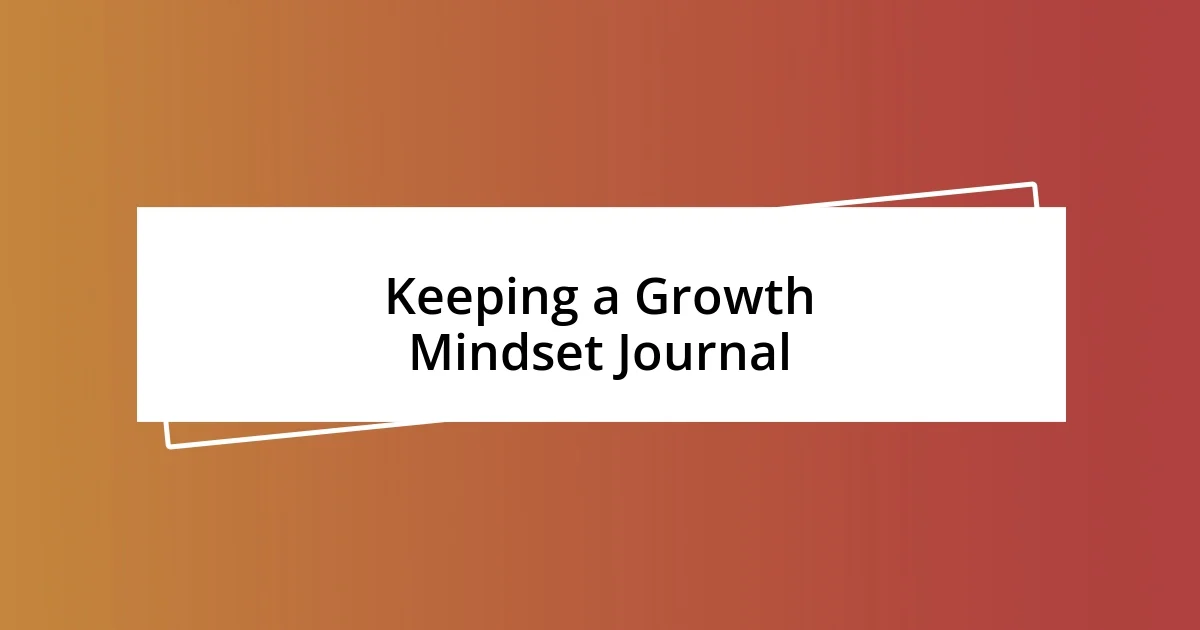
Keeping a Growth Mindset Journal
Keeping a growth mindset journal has truly transformed my self-reflection process. Each time I sit down to write, I feel like I’m having an intimate conversation with myself. I record my thoughts about setbacks, what I learned from them, and how I plan to navigate similar situations in the future. Have you ever thought about how powerful it is to put your thoughts on paper? In doing so, I can see patterns emerge in my behavior, which helps me make better decisions moving forward.
There was a moment when I decided to jot down my daily challenges and triumphs. I vividly remember a day filled with small failures that could have easily overwhelmed me. But as I reflected in my journal that evening, I found myself focusing not just on what went wrong but also on the small victories—the moments when I adapted or learned something new. It was eye-opening! Writing helped me to reframe my perspective entirely. What stories might you uncover if you took the time to write your experiences down?
Sometimes, I even include quotes or affirmations in my journal, which serve as reminders of my commitment to growth. One piece of advice that particularly resonates with me is, “The only limit to our realization of tomorrow will be our doubts of today.” Each time I revisit this quote, it reignites my passion for self-improvement and keeps me accountable. Do you have affirmations that push you toward growth? By consistently engaging with my journal, I cultivate resilience and a mindset that thrives on challenges, turning everyday experiences into stepping stones for progress.












